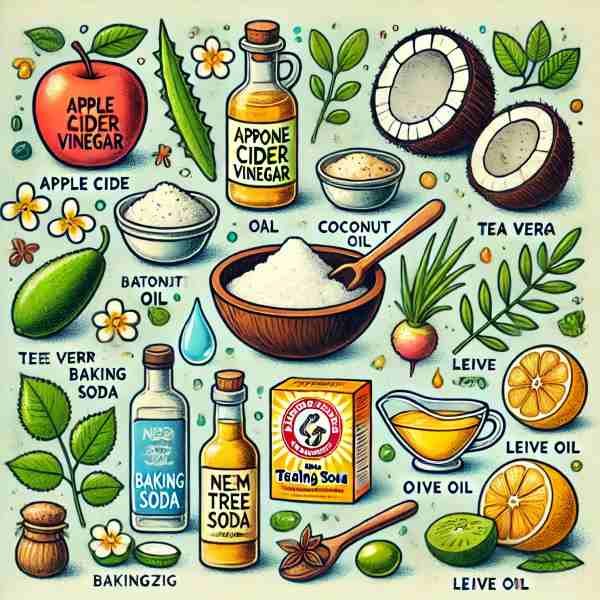Dandruff, which causes flaky skin and itching on the scalp, is a common problem many people face. Fortunately, several natural and home remedies can help soothe the scalp and reduce dandruff without the need for harsh chemicals.
This guide will look at some of the best home remedies and how they work and offer tips on how to use them effectively. These treatments are suitable for anyone dealing with dandruff or scalp irritation.
Recommended Reading: How To Get Rid Of A UTI In 24 Hours At Home (Instant UTI Relief)
Home Remedies for Dandruff and Itchy Scalp

Recommended Reading: Stop Tooth Pain Fast At Home At Night (Home Remedies)
What Are the Remedies?
The term “remedies” refers to treatments or solutions used to solve a problem or relieve a condition. In the context of health, remedies are often natural or medical methods used to treat symptoms or illnesses.
For example, home remedies are simple, natural treatments people use at home to cure minor health issues, like using honey for a sore throat or aloe vera for sunburn.
Recommended Reading: How To Lower Blood Pressure Naturally [Instantly Home Remedies]
Best Home Remedies for Dandruff and Itchy Scalp
Top 5 Best Home Remedies for Dandruff and Itchy Scalp
- Apple cider vinegar
- Coconut oil
- Aloe vera
- Tea tree oil
- Baking soda
- Neem
- Olive oil
- Lemon juice
- Healthy diet

Several natural ingredients can help treat dandruff and soothe an itchy scalp. Some of the most effective remedies include:
- Apple Cider Vinegar: This helps balance the scalp’s pH and has antifungal properties that can help fight the fungus responsible for dandruff.
- Coconut Oil: Known for its moisturizing effects, coconut oil hydrates the scalp and prevents dryness that can lead to flaking.
- Aloe Vera: Aloe vera has soothing and healing properties that calm irritated skin on the scalp.
- Tea Tree Oil: This essential oil is both antifungal and antibacterial, making it effective for treating dandruff caused by infections.
- Baking Soda: It gently exfoliates the scalp, removing dead skin cells and preventing buildup that can cause flakes.
- Neem: Used in traditional medicine, neem is a powerful antifungal plant that helps combat dandruff.
- Olive Oil: Olive oil deeply moisturizes and nourishes the scalp, reducing dryness and flaking.
- Lemon Juice: It helps control excess oil and balances the pH level of the scalp, making it harder for dandruff to develop.
- Healthy Diet: Eating a balanced diet rich in vitamins and nutrients supports scalp health from within and can help reduce dandruff.
How Do They Work?
These natural remedies work by:
- Reducing dryness and itchiness: Many of these ingredients, like coconut oil and aloe vera, moisturize the scalp, preventing dryness that leads to flakes.
- Balancing oil production: Remedies like lemon juice help control excess oil, which can worsen dandruff.
- Fighting fungi: Ingredients like apple cider vinegar, tea tree oil, and neem have antifungal properties, helping to reduce the fungus often responsible for dandruff.
Recommended Reading: Home Remedies For Vaginal Dryness (Symptoms, Causes, & Remedies)
Indications & Uses
Indications & Uses
Natural remedy ingredients like apple cider vinegar, coconut oil, and aloe vera, symbolize natural care for scalp health. The serene setting highlights the benefits of these remedies in a soft, sunlit ambiance.

Who Should Use These Remedies?
These remedies are perfect for anyone dealing with dandruff, an itchy scalp, or flaking skin. They are especially beneficial for those who prefer natural, chemical-free treatments to help manage their scalp conditions.
How to Use?
Here’s how you can use each remedy effectively:
- Apple Cider Vinegar: Dilute apple cider vinegar with water, apply it to your scalp, and leave it for 10-15 minutes before rinsing it out with water.
- Coconut Oil: Gently massage coconut oil into your scalp and leave it overnight. Wash it off in the morning.
- Aloe Vera: Apply fresh aloe vera gel directly to your scalp, leave it for 30 minutes, and then wash it off with lukewarm water.
- Tea Tree Oil: Mix a few drops of tea tree oil with a carrier oil (like coconut or olive oil) and massage it into your scalp.
- Baking Soda: Mix baking soda with water to create a paste, gently massage it into your scalp, and rinse it off.
- Neem: You can use neem oil or make a paste from fresh neem leaves and apply it to your scalp.
- Olive Oil: Warm the olive oil and apply it to your scalp for hydration. Leave it on for about 30 minutes before washing it off.
- Lemon Juice: Apply lemon juice directly to your scalp, leave it for 10 minutes, then rinse thoroughly with water.
Recommended Reading: How To Get Rid Of A UTI In 24 Hours At Home
Effectiveness
Effectiveness
Home remedies like tea tree oil, aloe vera, and neem, highlight their effectiveness in treating dandruff and promoting scalp health. The composition reflects both clinical support and traditional wisdom in a calming, professional setting.

Clinical Evidence
Some of the remedies, such as tea tree oil and aloe vera, have been supported by clinical studies showing their effectiveness in treating dandruff and soothing an itchy scalp. Tea tree oil, for example, has antifungal properties that help fight the fungus responsible for dandruff.
Aloe vera is known for its soothing and healing effects on irritated skin. However, other remedies like coconut oil and neem are based more on traditional use and anecdotal evidence.
Expected Results
With regular use, you can expect to experience relief from the itchiness and a noticeable reduction in dandruff flakes. Many people begin to see improvements after just a few applications.
Consistently using these remedies not only helps to reduce dandruff but also promotes overall scalp health, which can help prevent dandruff from returning.
Side Effects & Precautions
Side Effects & Precautions
Common side effects and precautions for natural remedies, with clear symbols like warning signs for lemon, tea tree oil, and apple cider vinegar. The serene background features a patch test demonstration and a doctor offering friendly guidance.

Common Side Effects
- Lemon Juice: If used too often or in high amounts, lemon juice can cause irritation or dryness on the scalp.
- Tea Tree Oil: Some people may experience allergic reactions, especially those with sensitive skin. It’s important to dilute it properly before use.
- Apple Cider Vinegar: Applying undiluted apple cider vinegar directly to the scalp may cause irritation due to its acidity.
Serious Side Effects
- Although rare, some individuals may experience allergic reactions to essential oils like tea tree or neem. Symptoms may include redness, itching, or swelling.
Precautions
- Patch Test: Always perform a patch test by applying a small amount of the remedy on your skin to check for any allergic reaction before using it on your scalp.
- Avoid if Allergic: If you are allergic or sensitive to any of the ingredients (e.g., lemon, tea tree oil, or neem), avoid using that remedy.
- Consult a Doctor: If your symptoms worsen or do not improve after using these remedies, consult a healthcare professional for further advice.
Pros & Cons
Advantages
- Affordable and Easy to Find: These home remedies are cost-effective and can be easily sourced from your kitchen or local store.
- Natural Ingredients: They provide a chemical-free solution, offering a more natural approach to treating dandruff and itchy scalp.
- Addresses Dandruff Causes: The remedies target common causes of dandruff, such as fungi, dryness, and irritation, helping to restore balance to the scalp.
Disadvantages
- Slower Results: Home remedies often take longer to show results compared to medicated treatments, requiring more patience for noticeable improvements.
- May Not Work for Severe Dandruff: In cases of severe dandruff or underlying medical conditions, these remedies might not be effective, and professional treatments could be necessary.
- Strong Odors: Some ingredients, like apple cider vinegar or neem, have strong smells that may not be pleasant for everyone.
Recommended Reading: Stop Tooth Pain Fast At Home At Night (Home Remedies)
FAQs
What causes dandruff and an itchy scalp?

Dandruff is often caused by a dry scalp, excess oil, or a fungal infection. It can also be triggered by skin conditions like eczema or psoriasis. The itchiness is usually due to irritation or dryness on the scalp.
How do natural remedies help with dandruff?

Natural remedies like coconut oil, apple cider vinegar, and tea tree oil help balance the scalp’s pH, reduce dryness, and fight the fungi responsible for dandruff. These ingredients can also soothe irritation and promote a healthier scalp.
How often should I use these remedies?
For best results, you can use these remedies 2-3 times a week. Some may be used daily, like coconut oil, while others, like apple cider vinegar, may work better when applied once a week to avoid scalp irritation.
Can I mix these remedies?
Yes, you can mix some of these remedies. For example, coconut oil and tea tree oil can be combined, but always make sure to dilute essential oils with a carrier oil. Avoid mixing ingredients like vinegar with lemon juice as it may irritate the scalp.
Do I need to stop using my regular shampoo or treatment?
You don’t need to stop using your regular shampoo. You can use these natural remedies alongside your usual hair care routine.
Conclusion
Summary of Findings
Home remedies can be a natural and effective approach to managing dandruff and itchy scalp. Ingredients like coconut oil, tea tree oil, and apple cider vinegar have proven beneficial in soothing the scalp, reducing flakes, and restoring balance.
Overall Recommendation
If you’re looking for a natural, affordable way to tackle dandruff, these remedies are a great option. However, it’s important to remember that results may vary, and they may work best for mild to moderate cases.
Who Should Use These Remedies?
These home remedies are most beneficial for those with mild to moderate dandruff. If you have severe dandruff or an underlying scalp condition, it might be best to consult a healthcare professional or opt for medicated treatments if these remedies don’t provide enough relief.

 Cart is empty
Cart is empty
Add a Comment